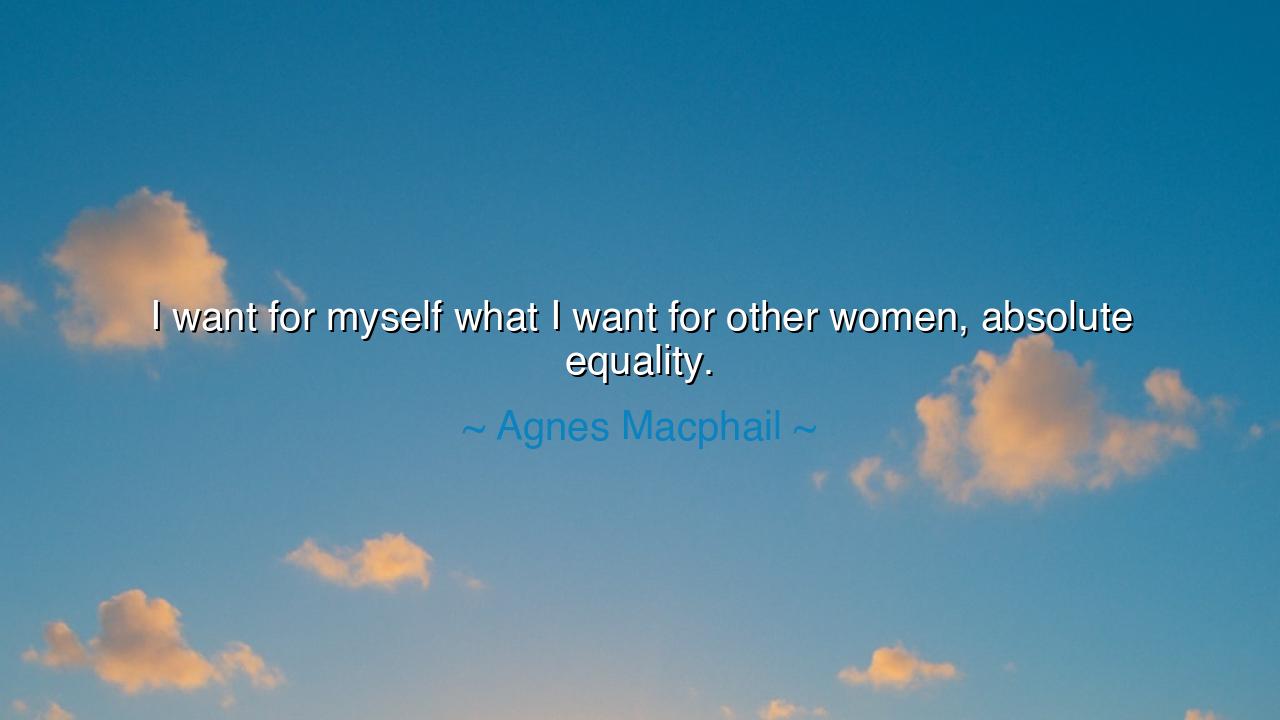
I want for myself what I want for other women, absolute equality.






When Agnes Macphail declared, “I want for myself what I want for other women, absolute equality,” she was not merely speaking for herself — she was voicing the eternal cry of the human soul for fairness, dignity, and recognition. In her words burns the ancient fire of justice, the same flame that once guided prophets, warriors, and reformers through centuries of struggle. Macphail, the first woman ever elected to the Canadian Parliament, spoke as one who had walked through the gates of exclusion and refused to bow. Her quote is both a declaration of personal integrity and a universal commandment — that the rights we claim for ourselves lose their purity if we do not demand them equally for others.
In the style of the ancients, one could say that Macphail spoke as a priestess of justice, offering her voice upon the altar of equality. Equality, to her, was not a gift to be begged for, but a law of nature — as natural as light falling upon mountain and meadow alike. When she said she wanted “absolute equality,” she was rejecting the half-measures of tokenism and the crumbs of conditional privilege. She envisioned a world where every woman, every soul, would walk the earth without apology — not as an exception to the rule, but as the living proof that freedom is indivisible.
The origin of this quote lies in a time of great transformation. The early twentieth century was an era when women were rising from the shadows of silence into the chambers of power. Macphail, born in rural Ontario, grew up in a world where women’s voices were considered ornamental, not authoritative. Yet through courage and intellect, she became a force of reform — an advocate for labor rights, prison reform, and gender equality. Her words came not from theory, but from the hard soil of lived experience, where she saw clearly that freedom for one means nothing if it is not freedom for all.
The essence of her message mirrors that of Sojourner Truth, who stood before a skeptical crowd in 1851 and cried, “Ain’t I a woman?” Both women — though divided by race, time, and nation — spoke the same language of truth. They knew that equality cannot be partial. It cannot lift some while leaving others bound. Absolute equality means the recognition that every individual, regardless of gender or birth, carries the same spark of the divine. To deny it in another is to dim it within oneself.
There is also in Macphail’s words a deep moral symmetry — a principle older than any law. She teaches that justice must begin within the self. To desire equality for oneself but not for others is hypocrisy; to desire it for all is holiness. In this, her wisdom aligns with the Golden Rule, spoken by sages across ages: Do unto others as you would have them do unto you. Yet she carries it further — not merely as a moral suggestion, but as a revolutionary demand. Equality is not charity, she reminds us; it is truth made manifest in human life.
Consider her life’s example: in Parliament, she stood alone among men who mocked and underestimated her, yet she never wavered. She fought for farmers, workers, and prisoners — for those whom society dismissed as unworthy. And in doing so, she revealed the soul of justice itself: that one’s power is hollow unless it is used to uplift others. Her equality was not the cold balance of numbers but the warm light of compassion — a belief that humanity is only whole when no one is left behind.
From her words emerges a lesson as sharp as it is gentle: seek no privilege you would deny another. Let your measure of justice be universal. Do not rise by climbing upon another’s back; rise by lifting others with you. True equality is not found in competition, but in communion — in standing side by side as co-creators of a fairer world. And when you demand respect for yourself, remember to extend it outward, until the circle of fairness encompasses all.
So let this teaching endure, passed from voice to voice like a sacred torch: absolute equality is not a dream of the weak, but the duty of the strong. It begins in the heart of one who refuses to accept dignity for herself while others are still denied it. Walk, then, as Agnes Macphail walked — proud yet humble, fierce yet just. For the measure of a civilization lies not in the grandeur of its leaders, but in how equally it honors every soul beneath its sky.






AAdministratorAdministrator
Welcome, honored guests. Please leave a comment, we will respond soon